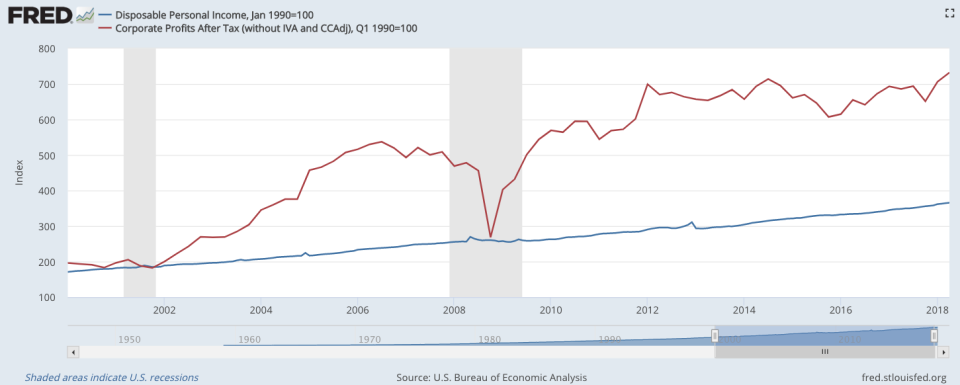The gaping hole in Trump’s economic boom
Corporate profits are at new highs, and the stock market keeps hitting new records, as well. There’s just one problem: Ordinary people aren’t seeing the same gains in their own paychecks. Not even close, in fact.
This chart, comparing growth in corporate profits (red line) with household personal income (blue line), says it all:

The GOP tax cuts Trump signed last year have pushed corporate profits to record levels, which Trump and his economists say will ultimately trickle down to ordinary workers as higher pay. But that could take years, as White House economist Kevin Hassett and others acknowledge. Republicans, meanwhile, have to persuade voters that large corporate tax cuts are good for ordinary workers, which seems to be a tough sell as the midterm elections approach.
A problem going back to 2000
Stagnant income has been a persistent problem since at least 2000, and there’s no evidence yet that Trump has come up with a better solution than any of his predecessors. Corporate profits and disposable personal income grew at roughly the same rate from the end of World War II through the early 1990s. Corporate profits surged during the mid-90s but fell back during the dot-com bust. After that, however, the growth in corporate profits took off while personal income flatlined.
A few factors probably explain the giant gap between corporate and personal earnings. Digital technology has allowed companies to automate and streamline, lowering labor costs and boosting profitability. And workers who lack digital skills are finding it harder and harder to land good-paying jobs that help improve their living standards.
Globalization has also allowed big companies to move work wherever it can be done cheapest. That enhances corporate profits, while harming those whose livelihoods are affected. Some workers evolve by developing new skills and moving to where there are better jobs. But some don’t, and government programs meant to help workers hurt when jobs move overseas are generally considered insufficient and ineffective.
Data compiled by Sentier Research shows that median household income, adjusted for inflation, plunged during and after the Great Recession, which began in 2007. The recession ended in 2009, but incomes didn’t bottom out until 2011. There was a meaningful jump in incomes from 2014 to 2016, followed by a stall, and then another growth spurt starting in 2017. So there’s been income growth under both President Obama and President Trump. Here’s the chart, with the red line representing household income and the gray line showing the unemployment rate:

Even with recent growth, however, the latest Sentier data shows household income in July was just 3.1% higher than it was in 2000, when factoring in inflation. That’s meager income growth, and it explains why many families feel they’re falling behind, even with unemployment at a very low 3.9%. Since 2000, growth in corporate profits has outpaced growth in household income by roughly 2.5 to 1.
The latest Labor Department numbers show wages and salaries growing at 2.8% per year. By one measure, that’s the biggest growth in income since 2008. But inflation is 2.9% per year. So the purchasing power of the average household is actually declining.
Trump didn’t create this problem. But his tax cuts, which provide more benefit to businesses and wealthy earners than to middle-income workers, seem almost certain to widen income inequality, rather than reduce it. That’s why the tax cuts remain unpopular, and why Republicans don’t seem to be earning points on the economy the way they feel they should. Businesses are happy. But a lot of ordinary workers wonder when the cheer will spread to them.
Confidential tip line: rickjnewman@yahoo.com. Click here to get Rick’s stories by email.
Read more:
Rick Newman is the author of four books, including “Rebounders: How Winners Pivot from Setback to Success.” Follow him on Twitter: @rickjnewman

 Yahoo Finance
Yahoo Finance 

